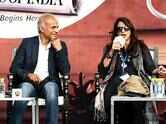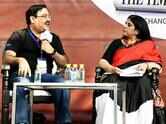Crime fiction allows me to talk about things that bother me on a daily basis: Anita Nair
TNN | Dec 4, 2018, 12:25 IST Anita Nair (right) and Arunava Sinha during the session 'Bending The Genre: Experimenting with Style'
Anita Nair (right) and Arunava Sinha during the session 'Bending The Genre: Experimenting with Style'During a session on 'Bending The Genre: Experimenting with Style' with Arunava Sinha, Anita said, “There is a great sense of freedom in writing crime fiction because one of my parts—the multiple parts that I am made of—is very interested in social commentary. But when I bring in social commentary in literary fiction, it becomes rather dense and heavy. Whereas, crime fiction allowed me to talk about things that bothered me on a daily basis. I could make social commentary, which would fit beautifully with the narrative.” Besides her literary novels like ‘The Better Man’, ‘Ladies Coupé’ and the recently-released ‘Eating Wasps’, Anita is also the author of the Inspector Gowda series.
Anita, who said she had never read a crime fiction before she started writing one, took up the genre because she wanted to write a book that has nothing to do with Indian women in India. “I was on a book tour in Europe after the novel ‘Lessons in Forgetting’ was published. And every place I went to, people asked me this same set of questions— what is the state of Indian women in India? When people keep asking you the same questions again and again, it becomes a little difficult. Imagine facing ten journalists with the same questions. I then wanted to work on a book which is a complete departure from all these.”
Anita during another session, ‘Once upon a novel’, shared her views about the state of the novel in the modern times along with co-speakers Upamanyu Chatterjee and Carlo Pizzati.
While Upamanyu believed that, “Times change, society change and if the form of the novel changes, it’s no big deal”, Carlo was worried about the genre. "The novel is going through a crisis in this time of digitisation of data," shared Carlo.




















































































All Comments ()+^ Back to Top
Refrain from posting comments that are obscene, defamatory or inflammatory, and do not indulge in personal attacks, name calling or inciting hatred against any community. Help us delete comments that do not follow these guidelines by marking them offensive. Let's work together to keep the conversation civil.
HIDE